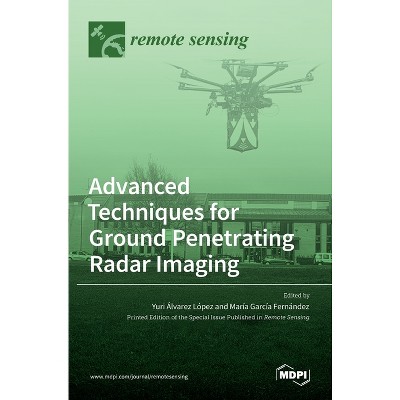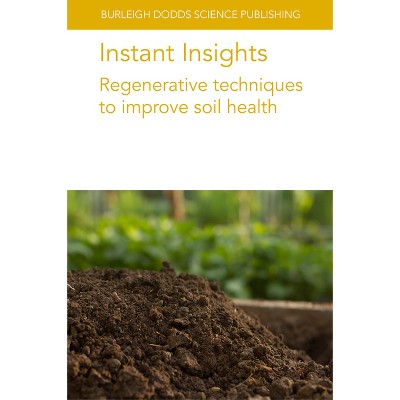Omics-Based Techniques for Global Food Security - by Sajid Fiaz & Channapatna S Prakash (Hardcover)

About this item
Highlights
- OMICs-based Techniques for Global Food Security Forward-thinking resource discussing how to integrate OMICs and novel genome editing technologies for sustainable crop production OMICS-based Techniques for Global Food Security provides an in-depth understanding of the mechanisms of OMICs techniques for crop improvement, details how OMICs techniques can contribute to identifying genes and traits with economic benefits, and explains how to develop crop plants with improved yield, quality, and resistance to stresses through genome editing technologies, providing evidence on the developments of climate resilient crops via applications of genome editing techniques throughout.
- About the Author: Sajid Fiaz, Assistant Professor, Department of Plant Breeding and Genetics, The University of Haripur, Pakistan.
- 320 Pages
- Technology, Agriculture
Description
About the Book
"The FAO has estimated that the global human population will reach approximately 9 billion by the year 2050. To meet the increasing demand, the worlds farming system will need to produce 50% more food than currently in production. The problem is further aggravated by narrow genetic makeup of cultivated crops, application of classical breeding approaches, less investment in cutting edge techniques coupled with biotic and abiotic factors under global climate change. Plant breeding based technologies have contributed significantly to hunger reduction in recent decades. However, the global food requirements can't be meet through conventional breeding methods. The recent crop improvement efforts are targeting novel plant breeding approaches based on OMICs technologies i.e., phenomics, proteomics, genomics and transcriptomics etc. along with genome editing for important traits. The OMICs based high-throughput approaches provide vast information on genes, protein and metabolites, further analyzed through statistical methods to create crop varieties via elucidating metabolic and biological systems response for various biotic and abiotic stresses. Furthermore, the screening of large germplasm pools for identification of novel alleles can be accelerated with OMICs based technologies ultimately enhancing the availability of variation for breeding. Omics based approaches have also helped develop new metabolically engineered crop plants with desirable agronomic traits and has facilitated de novo domestication of new crops for sustainable agriculture and food security. In addition to OMICs the discovery of the CRISPR/Cas9 system by Jennifer Doudna and her colleague Emmanuelle Charpentier for targeted genome editing has provided a new tool to scientists and revolutionized genome editing with greater flexibility, precision and efficiency to edit genes of interest. This technique is as a game-changer in plant engineering as it causes genome editing similar to natural mutations. The CRISPR system has been successfully employed in several agricultural important crops e.g., Oryza sativa, Zea Mays, Triticum aestivum, Solanum tuberosum etc. for improving yield, quality, biotic and abiotic stress resistance, and climate resilient crops. These achievements were possible due to precise prediction of causal genes and metabolic pathways achieved by interpretation of data generated through OMICs based approaches. In addition, the CRISPR based system is evolving further and enabling researchers to exploit its advance versions like base and prime editing to modify domesticated traits as per the current needs of human beings"--Book Synopsis
OMICs-based Techniques for Global Food SecurityForward-thinking resource discussing how to integrate OMICs and novel genome editing technologies for sustainable crop production
OMICS-based Techniques for Global Food Security provides an in-depth understanding of the mechanisms of OMICs techniques for crop improvement, details how OMICs techniques can contribute to identifying genes and traits with economic benefits, and explains how to develop crop plants with improved yield, quality, and resistance to stresses through genome editing technologies, providing evidence on the developments of climate resilient crops via applications of genome editing techniques throughout.
The text covers the application of OMICs in crop plants, the integration of bioinformatics and multi-OMICs for precision breeding, de-novo domestication, CRISPR/Cas system for crop improvement, hybrid seed production, transgene free breeding, regulation for genome edit crops, bioinformatics and genome editing, and other topics related to OMICs and genome editing.
The text also includes a chapter on global regulations for genome edited crops, and explains how these regulations influence novel plant breeding techniques in their adopted countries.
Edited by two highly qualified academics, OMICs-based Techniques for Global Food Security covers topics such as:
- Crops genome sequencing and their application for crop improvement, and functional characterization of cereal genome
- The role of OMICs-based technologies in plant sciences and utilization of different multi-OMICs approaches for crop improvement
- Genomic database and genetic resource of cereals, speed breeding for rapid crop improvement, and evolution of genome editing technologies
- CRISPR system discovery, history, and future perspective, and CRISPR/Cas system for biotic and abiotic stress resistance in cereals
Providing a collection of recent literature focusing on developments and applications of OMICs-based technologies for crop improvement, OMICs-based Techniques for Global Food Security is an important read for plant breeders, molecular biologists, researchers, postdoctoral fellows, and students in disciplines for developing crops with high yield and nutritional potential.
From the Back Cover
Forward-thinking resource discussing how to integrate OMICs and novel genome editing technologies for sustainable crop production
OMICS-based Techniques for Global Food Security provides an in-depth understanding of the mechanisms of OMICs techniques for crop improvement, details how OMICs techniques can contribute to identifying genes and traits with economic benefits, and explains how to develop crop plants with improved yield, quality, and resistance to stresses through genome editing technologies, providing evidence on the developments of climate resilient crops via applications of genome editing techniques throughout.
The text covers the application of OMICs in crop plants, the integration of bioinformatics and multi-OMICs for precision breeding, de-novo domestication, CRISPR/Cas system for crop improvement, hybrid seed production, transgene free breeding, regulation for genome edit crops, bioinformatics and genome editing, and other topics related to OMICs and genome editing.
The text also includes a chapter on global regulations for genome edited crops, and explains how these regulations influence novel plant breeding techniques in their adopted countries.
Edited by two highly qualified academics, OMICs-based Techniques for Global Food Security covers topics such as:
- Crops genome sequencing and their application for crop improvement, and functional characterization of cereal genome
- The role of OMICs-based technologies in plant sciences and utilization of different multi-OMICs approaches for crop improvement
- Genomic database and genetic resource of cereals, speed breeding for rapid crop improvement, and evolution of genome editing technologies
- CRISPR system discovery, history, and future perspective, and CRISPR/Cas system for biotic and abiotic stress resistance in cereals
Providing a collection of recent literature focusing on developments and applications of OMICs-based technologies for crop improvement, OMICs-based Techniques for Global Food Security is an important read for plant breeders, molecular biologists, researchers, postdoctoral fellows, and students in disciplines for developing crops with high yield and nutritional potential.
About the Author
Sajid Fiaz, Assistant Professor, Department of Plant Breeding and Genetics, The University of Haripur, Pakistan. Professor Fiaz obtained his PhD in Crop Genetics and Breeding from the Chinese Academy of Agricultural Sciences, China, in 2019.
Channapatna S. Prakash, Dean, College of Arts and Sciences, Tuskegee University, Kenney Hall, Tuskegee, USA. Professor Prakash has served on the USDA's Agricultural Biotechnology Advisory Committee and the Advisory Committee for the Department of Biotechnology for the Government of India.











